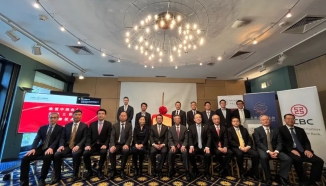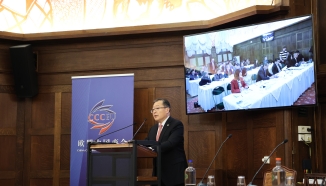CCCEU Responds to EU's Closure of FSR Investigations
CCCEU Responds to EU's Closure of FSR Investigations into Chinese Companies in Romanian Photovoltaic Park Procurement
May 13, 2024, Brussels
CCCEU:
On May 13, 2024, China Chamber of Commerce to the EU (CCCEU) took note of the European Commission (EC)'s announcement to close its in-depth FSR investigations against Chinese companies Longi and Shanghai Electric, subsequent to their withdrawal from a public procurement procedure concerning the construction of the photovoltaic park in Romania.
The chamber underscores that the deployment of the FSR as a tool of economic coercion under the guise of economic security left Chinese enterprises with no commercially prudent options but to withdraw from the troublesome, damaging, and uncertain legal procedures.
The Romanian solar project facilitates its government and EU energy transition goals by promoting green electricity production and local job creation. The withdrawal of Chinese companies not only causes substantial losses for these enterprises but also hampers the EU and its member state's green transformation efforts. This underscores the negative consequences of the EC's series of FSR investigations—a triple-loss scenario involving harm to its own business environment, hindrance to Europe's green transition, and loss of competitive Chinese bidders.
Despite the announced closure of the in-depth probes, the CCCEU remains deeply concerned about the selective transparency and potentially discriminatory application of the FSR by the Commission during the investigations. The chamber highlighted that while Chinese companies faced heightened scrutiny, other non-EU entities participating in the same tender process were not subjected to similar levels of investigation. The CCCEU believes that this selective enforcement of the FSR raises serious questions about the fairness, objectivity, and consistency of the Commission's approach, potentially damaging the reputation and competitiveness of Chinese companies in Europe.
It is noteworthy that "foreign financial contribution" differs from "foreign subsidy." The CCCEU reiterates that the Commission has failed to provide sufficient justification or explanation regarding how the financial contributions identified confer specific benefits or are uniquely available to certain enterprises or industries, which is a prerequisite for these contributions to be considered subsidies. The lack of detailed analysis undermines the validity of the Commission's claims in its FSR investigations, raising grave concerns about the fairness and transparency of the investigation process.
In addition, the CCCEU expresses apprehensions about the burden placed on Chinese companies by the broad information requests and the potential disclosure of sensitive business data under the FSR.The CCCEU stresses that such disproportionate obligations, coupled with inadequate time for compliance, could have detrimental effects on Chinese companies' ability to operate in the European market. The Chamber emphasises the need for the Commission to narrow its information requests to focus solely on entities directly involved in public procurement bids and their relevant activities, excluding parent companies or affiliates unless their substantial involvement is evident.
The chamber is also of the view that the in-depth investigations under the FSR in question might potentially breach relevant provisions of the World Trade Organisation (WTO). It urges the European side to review its FSR enforcement approach to guarantee adherence to international trade regulations and equitable treatment for all parties concerned.
Since the FSR has significantly heightened uncertainties for Chinese and wider foreign bidders, prompting deep concern regarding the EU's escalating protectionist tendencies and misuse of policy instruments, the chamber earnestly urges the EU to promptly reassess the FSR's implementation and its adverse effects on EU investment and public procurement sectors.
The CCCEU advocates for the EU institutions to uphold principles of market openness and fair competition in policy implementation, avoiding discrimination against foreign companies, and preventing new distortions in acquisition transactions or public procurement processes.
The chamber urges the EU to objectively recognise the contributions of Chinese companies to Europe's green transition and social development and to ensure that Chinese enterprises are provided with a fair, transparent, and non-discriminatory environment in which to operate.

 Login
Login Login
Login CCCEU officially launches Finance Working Group in Luxembourg
CCCEU officially launches Finance Working Group in Luxembourg CCCEU Report: Chinese Business Expands in EU Amidst Growth, Yet Sentiment Slips to 4-Year Low with Slower Pace
CCCEU Report: Chinese Business Expands in EU Amidst Growth, Yet Sentiment Slips to 4-Year Low with Slower Pace



